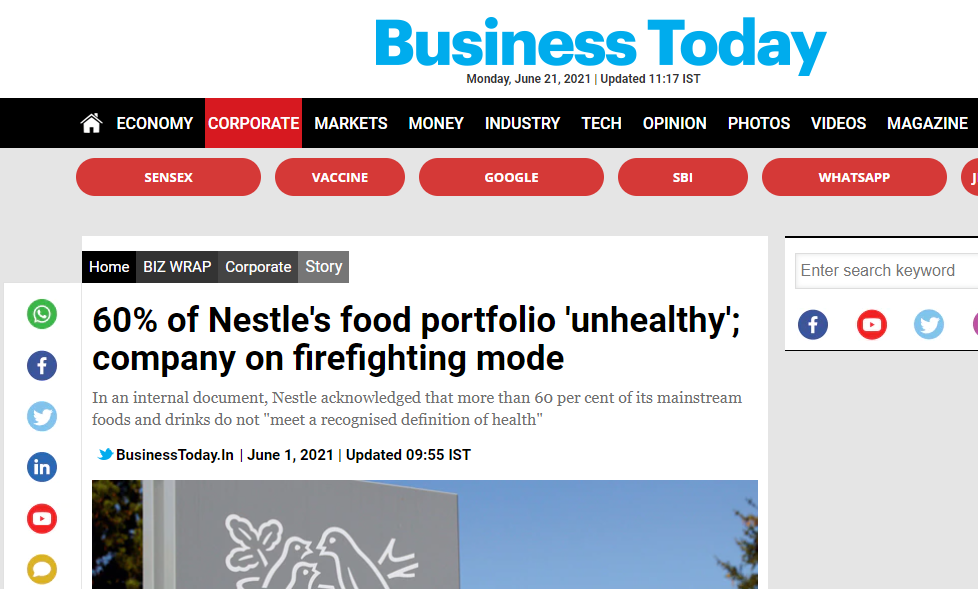
Here at the Maturity Institute (MI) we have been liaising with Nestlé for some years now, since we wrote our seminal report on their first OMINDEX® rating in 2015. More recently, we have been corresponding with CEO Mark Schneider and his Investor Relations team about a New York Times article asking whether Nestlé can be both “virtuous and profitable”? The above headline, from 2 days ago, suggests their ESG efforts are now heading in the wrong direction, on both counts. The lesson here, for all firms trying to be ESG responsible, is that if your strategy isn’t a coherent combination of a great business strategy, reconciled with changing values in society, it will backfire.
Nestlé’s ESG hypocrisy was revealed in a leaked internal report (maybe by an employee who wants to work for a genuine ESG employer?) which shows it knows how much ‘unhealthy food’ it is producing. Every company on the planet is now facing a similar challenge in their own ESG journey: previous business ethics and practices are being called out. Over the last 50 years especially, listed companies have looked after the interests of shareholders to the detriment of a wide range of other stakeholders, and the planet itself. Essentially, Nestlé’s primary concern has always been to produce foods that would sell and make acceptable financial returns for its shareholders. So should we have any sympathy for Mark, and other ‘shareholder-driven’ CEOs; who now have to justify their business decisions on the basis of societal concerns? Maybe.
We human beings are incredibly difficult creatures to satisfy when it comes to balancing morality, ethics and money. As good citizens we want companies to be totally responsible while, as consumers, we happily carry on eating their ‘unhealthy’ chocolate and ice cream (and offer it to our own children). So MI does not expect CEOs to become ‘holier than thou’ in the pursuit of ESG. Instead, we want intelligent CEOs (like Mark) to apply the full extent of their intellects to the right ESG tasks. This demands that they view the challenge through very different eyes: as a huge opportunity for competitive differentiation. The competitors of our ESG exemplars find their successful formula very difficult to copy.
Mark’s predecessor, Paul Bulcke, had already made one attempt at ESG, when Nestlé chose to work with a ‘Harvard’ concept of ‘shared value’, promoted in a 2013 TED talk by Professor Michael Porter. Elsewhere at Harvard, other academics have been working on other aspects and applications of ESG (e.g. ‘Impact Weighted Accounts’). Yet there is no single, ready-made, Harvard solution for this highly complex, and often contradictory, mix of corporate management issues; that are all supposed to be tied up neatly into one ESG package. Indeed, business schools generally, are only just waking up to the fact that while ESG has been fermenting it has produced a new brew that makes conventional management education seem obsolete (see the FT Special Report: Responsible Business Education).
Porter’s TED talk arrived at exactly the same time as MI was established. Our OMINDEX® maturity model was designed to address every aspect of ESG, as a complete and whole management system. The essential ingredient in our ESG system is the world’s entire supply of human capital and how it can be enabled, and managed, to create Total Stakeholder Value (TSV) for everyone’s benefit. As with any management system, it requires a common standard supported by a common measurement system. The world has yet to agree on these. Meanwhile, our system had already been tested, in many companies around the world, for well over 20 years. This probably explains why Harvard Law School’s ‘Pensions and Capital Stewardship Program’ (another ESG-related effort) took such great interest in OMINDEX® when we launched in 2015.
Transformation into a mature, ESG business is a never-ending journey because the world will always keep changing. We have unearthed many insights and learned important lessons along the way as we build a stronger, more robust, scientifically-validated, evidence-based, solid foundation for MI’s standard. OMINDEX® measures how companies address all of their ESG responsibilities, at once, to the Environment, to Society at large, for good Governance AND shareholders. It also assesses a company’s authenticity and true intentionality when making any attempt to address their own, particular, ESG challenges.
Today, Nestlé is having to ‘firefight’ because its ‘shared value’ model has not provided a working ESG solution. Instead, it is now perceived as strategically incoherent; a huge embarrassment for Nestlé’s board, Executive and every single one of its employees and suppliers (did they realise what type of company they really worked for?). From a specifically commercial perspective, it makes Nestlé very vulnerable to short-termist, die-hard, adherents of the worst form of ‘shareholder capitalism’; who don’t factor societal responsibility into their business thinking and dealing. ESG has arisen precisely because many businesses seem to possess no virtues. We can no longer trust (if we ever did) a form of capitalism that has lost sight of its roots in society.
MI will keep up its open and constructive dialogue with Nestlé, simply because we cannot give up until they subscribe to the goal of Total Stakeholder Value – it is in Mark’s, and all other CEOs’, interests; as well everyone else on the planet.
Comments are closed